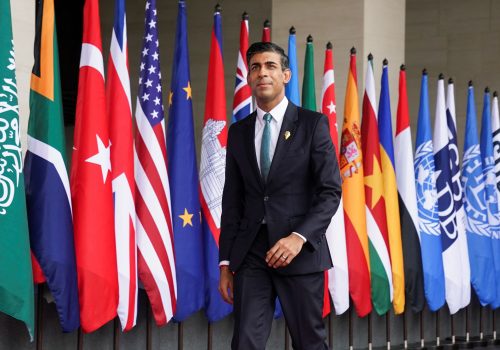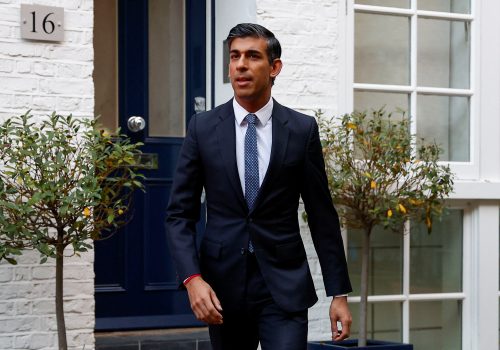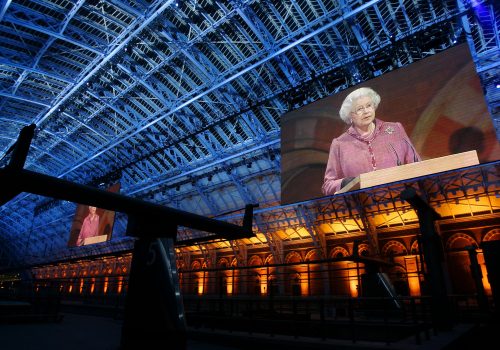Experts react: Will a new deal on Northern Ireland repair UK-EU relations?
It was borderline shocking. On Monday, UK Prime Minister Rishi Sunak and European Commission President Ursula von der Leyen announced a deal on trade across the Irish border—an issue that has bedeviled Brexit and soured relations with the European Union (EU) for years. The deal would establish separate channels for goods coming from Britain that are intended to remain in Northern Ireland versus those heading on to the Republic of Ireland, an EU member state. What would the deal, which still must be approved by the UK Parliament, mean for regional trade and diplomacy? What does it say about Sunak’s approach to foreign policy? Our experts ship off their answers below.
Frances Burwell: Sunak proves the UK and EU can work together—at his own political peril
Livia Godaert: What this deal says about the union, the monarchy, and the PM’s soft power
Jörn Fleck: The UK and EU can finally move forward on trade, defense, and more
Sunak proves the UK and EU can work together—at his own political peril
The agreement Monday between the United Kingdom and the European Commission on Northern Ireland represents a remarkable reconciliation between the EU and the UK government. As prime ministers, Boris Johnson and Liz Truss had completely lost the confidence of the European Commission and of the EU member state governments. Since moving into Number 10, Sunak—a Brexit supporter from the beginning—has proven that the United Kingdom and EU can address their differences constructively. Analysts have long seen a path forward in these negotiations to a settlement very similar to the one announced today, so the details are not surprising. But until Sunak became prime minister and established a more pragmatic approach, there was little chance that even this obvious solution could be agreed upon.
This more constructive climate is vital not only for achieving the Windsor Framework, but also because there will inevitably be hiccups in its implementation. Both parties, and the Northern Ireland government in Stormont, must be prepared for continuing negotiations over technical details. For those who want to play politics and exacerbate differences, there will be plenty of ammunition. But we can hope that calmer personalities will prevail and push forward to make this new arrangement work. If it does work, Northern Ireland stands to benefit tremendously. Not only will there be renewed political stability, but foreign direct investment, especially in the manufacturing sector, will be strong, given that the province will be a doorway to both the EU and UK markets.
However, the agreement has some tall hurdles to overcome before it becomes reality. Sunak has pledged to let Parliament vote on the accord, and a wing of his own party, the Conservatives, seems oddly opposed to anything that will finalize Brexit. Perhaps these MPs see themselves coming back to power if divisions over Brexit persist, and thus a settlement is contrary to their ambitions. Similarly, the Democratic Unionist Party (DUP) has found political support in opposing the previous arrangement—the Northern Ireland Protocol—and it is not clear that the DUP will now go along with this new formulation (party leaders say they will take a few days to review and decide).
A failure by the United Kingdom to formally adopt the Windsor Framework will trigger two crises: a political crisis within the United Kingdom and a rupture in UK-EU relations. Sunak cannot survive as prime minister if defeated on such a major issue. Moreover, if he wins the parliamentary vote because of the support of the Labour party (which has already indicated that it favors the agreement) rather than his own, he will be significantly wounded. Britain will likely return to the state of continuous political chaos that it suffered from 2016 until Sunak’s arrival, with consequences for both domestic governance and its international presence. Failure to move forward with this agreement will also cause an enormous rupture with the EU, exactly when the United Kingdom and EU need to be working together on a range of issues, from climate change to Ukraine. Already in Brussels, there is a feeling that the United Kingdom has essentially disappeared, rather than building a new relationship. The fate of the Windsor Framework will determine the future of that cross-Channel partnership—or even if there will be one.
—Frances Burwell is a distinguished fellow at the Atlantic Council and a senior director at McLarty Associates.
What this deal says about the union, the monarchy, and the PM’s soft power
It’s not déjà vu or a time loop—there has been an agreement reached between the United Kingdom and the EU on Northern Ireland. Again. As we parse through the nitty-gritty details of yet another “agreement in principle” between the United Kingdom and the EU, there are three interesting takeaways for the state of the United Kingdom and its role in the world, seven years on from the initial Brexit vote.
Let’s first talk about devolution and what this agreement tells us about the state of the union. This framework—which renames and replaces the beleaguered Northern Ireland Protocol—gives an important power to Stormont. This agreement establishes the “Stormont Brake,” which would allow Northern Ireland to call for the UK government to veto any new or amended EU rules that would have a “significant impact on the day-to-day lives of businesses and citizens.” Within the context of a long-running dispute with the Democratic Unionist Party, which refuses to participate in Northern Ireland’s power-sharing arrangement because of the Northern Ireland Protocol, and broader debates about the Union writ large, this is a significant outreach.
The rhetoric of addressing a democratic deficit, of upholding constitutional duties to the Good Friday (Belfast) Agreement, and of “safeguarding” Northern Ireland’s place in the union reflect a deeper anxiety. This agreement follows a strong showing by Sinn Fein in last year’s Northern Ireland assembly elections, as well as a fight of a different nature with Scotland over a gender self-identification bill that brought Number 10 and Holyrood to the brink of a constitutional standoff. The unity of the kingdom has felt precarious since the Brexit vote, but there is a new urgency. The cost-of-living crisis has thrown into sharp relief the fact that that the petty interparty squabbles of the last several years have real consequences outside Westminster, and that some parts of the union may have had enough. Number 10 may be hedging its bets here, building up goodwill and incentivizing partnership with the devolved government in Northern Ireland to stave off further intra-UK fights.
Second, the role of the monarchy in this agreement cannot be ignored. The United Kingdom no longer has a sovereign removed from politics—unlike Queen Elizabeth II, King Charles III engaged with a variety of political issues before ascending to the throne. We see the next stage of this in how intertwined the monarchy is with the optics of this agreement: from its name—the Windsor Framework—to the meeting between the king and von der Leyen at Windsor Castle on the official itinerary. Whether this is a net benefit or negative remains to be seen, as some Parliament backbenchers have expressed anger at the king for this intervention, but it marks a new era in the relationship between the government and the monarchy.
A third takeaway is that this is a soft-power victory for Sunak. There are still fights to be had with Parliament and the DUP, and Northern Ireland will probably always be a point of re-negotiation and tension in the UK-EU relationship, but managing to untangle the mess that his predecessors made of Northern Ireland in their various negotiations is quite an achievement. When Sunak was first appointed as prime minister, I made the point that one of his key priorities should be repairing Britain’s reputation on the international stage, particularly with the EU and the United States. The Northern Ireland Protocol—and the subsequent bill attempting to take it all back—was a sticking point in both of these key relationships, and Sunak has shown that he is capable of taking that huge step forward.
This will open doors for the United Kingdom to pursue its broader international strategy. For example, von der Leyen has already discussed allowing the United Kingdom to participate in the Horizon research scheme, which will be key to the success of Sunak’s technology-focused government reshuffle. The Windsor Framework shows that Sunak is capable of moving beyond Brexit to be a partner to friends and allies. He also can break through a stalemate, a skill that will be an asset for the entire transatlantic community if he can continue to wield it.
—Livia Godaert is a nonresident fellow at the Atlantic Council’s Europe Center.
The UK and EU can finally move forward on trade, defense, and more
The new Northern Ireland Protocol deal is a pragmatic compromise and a welcome sign for EU-UK relations. But the announcement of the so-called Windsor Framework is just the first step. The agreement itself will need to be approved by both the European Union’s members and, more crucially, the UK House of Commons—whose earlier rejections of the “Irish backstop” to deal with the border issue ended Theresa May’s premiership.
More broadly, the compromise could be a stepping stone toward a more constructive EU-UK relationship. That von der Leyen traveled to London to iron out the details personally and announce the agreement shows the concerted effort and goodwill in Brussels and London to move past the worst parts of the Brexit acrimony. For years the relationship between London and Brussels was toxic, and even a short train ride by the Commission president to London would have been unthinkable. But geography, economic realities, and the need for European and transatlantic unity in the face of Russia’s aggression in Ukraine all make a lasting estrangement between the United Kingdom and the EU unsustainable. The Northern Ireland Protocol remained the foundational roadblock to setting the UK-EU relationship on a better footing. With the matter on the path to be settled, Brussels and Britain can finally begin to build out a successful and productive relationship on issues of trade, defense cooperation, and even digital policy—especially when unity is needed now more than ever.
—Jörn Fleck is the senior director of the Atlantic Council’s Europe Center.
Further reading
Thu, Dec 22, 2022
Rishi Sunak needs to do away with caution to deliver on his promise of evolutionary foreign policy
New Atlanticist By James Batchik
With Russia’s upending of Europe’s security and the geopolitical shift toward the Indo-Pacific, the UK prime minister needs to offer more if Britain is to be a partner of first resort.
Mon, Oct 24, 2022
Experts react: Rishi Sunak makes history as newest UK prime minister. Can he calm a country in chaos?
Experts react By
Can Sunak calm the markets and the country? What should the world expect from Great Britain’s new leader? Our experts are on the case.
Fri, Sep 16, 2022
The lesson Queen Elizabeth II leaves for King Charles III
New Atlanticist By Andrew R. Marshall
The United Kingdom is a country where change has been the rule. And what’s most notable about the monarchy is, in fact, its ability to adapt to that change.
Image: British Prime Minister Rishi Sunak greets European Commission President Ursula von der Leyen at the Fairmont Hotel in Windsor, Britain, February 27, 2023. Dan Kitwood/Pool via REUTERS


